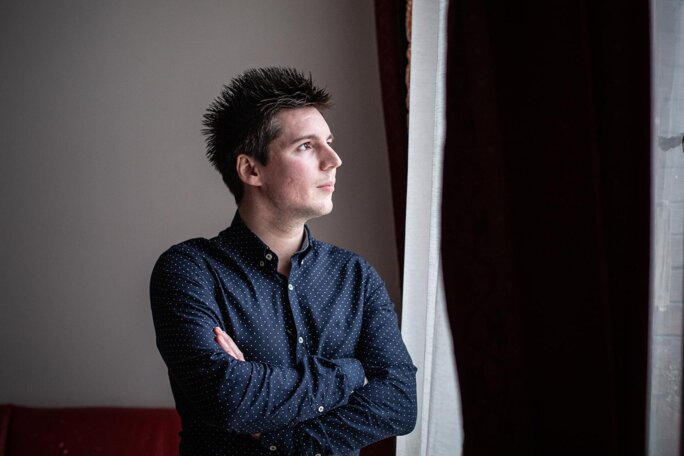A court in Lisbon on Monday handed Rui Pinto, the whistleblower behind the Football Leaks revelations, a four-year suspended prison sentence after being found guilty of illegally accessing data, violation of the privacy of correspondence, and attempted extortion.
At the start of his trial in September 2020, Pinto, who served a year in preventive detention, faced 90 charges and up to 25 years in jail. The 34-year-old has maintained throughout that he is a whistleblower acting in the public interest.
Pinto was extradited to Portugal in 2019 from Hungary, where he had set up home, following the issuing of an international arrest warrant against him. Immediately placed in solitary confinement, he was later placed under house arrest. At the time, Pinto denounced the Portuguese prosecution services for ignoring information he had previously passed on to them revealing corrupt practices within professional football in Portugal.

Enlargement : Illustration 1

In 2015, Pinto first published on his own website, called “Football Leaks”, a small part of the hacked information exposing corruption and fraud within the business side of football before he handed over the vast remaining data, totalling 70 million mostly confidential documents, to German weekly Der Spiegel. The magazine then shared investigation of the hacked information with Mediapart and other partners in the European journalistic consortium EIC, and the resulting series of revealing articles borrowed the name Football Leaks.
Mediapart began publishing its own investigations based on the data in 2016, exposing the inflated salaries and systemic tax evasion of star players, including Cristiano Ronaldo, the behind-the-scenes, shady dealings between agents and clubs, including Paris Saint-Germain, and questionable practices at Fifa and UEFA. In 2018 Mediapart published a second series of investigations resulting from the information hacked by Pinto.
In all, the media partners at the EIC published more than 1,000 articles on the dark side of the business carried out off the pitch, and which prompted the opening of judicial investigations in several countries, including France.
“Rui Pinto was certainly convicted, but it is a relief that the demands of the prosecution services, which called for several years in prison without remission, were not upheld,” French lawyer William Bourdon told Mediapart. Bourdon and his Portuguese colleagues Francisco and Luísa Teixeira da Mota, represented Pinto throughout the case. “We’re going to study the ruling very closely in order to decide whether or not to launch an appeal,” added Bourdon.

Enlargement : Illustration 2

In a joint statement released after the verdict on Monday, Pinto’s three lawyers said they were “delighted” that the court had “shown its independence” and that it “was able to take into account Rui Pinto’s exceptional contribution to the protection of major public interests”. They also noted that several witnesses had confirmed before the court “the fact that he [Rui Pinto] is one of the greatest whistleblowers of recent years in Europe”.
The verdict, read in court by presiding judge Margarida Alves, underlined that Pinto was found guilty because computer hacking had to be punished, even though, she concluded, he had contributed to “the public interest”.
“The right to secrecy [of correspondence] prevails over the right to freedom of expression,” she said. “[…] The truth is not an absolute value and must not be the object of investigations to whatever cost.” Nevertheless, the court decided to suspend the whole of the prison sentence handed to Pinto because of the public interest of his revelations which he shared with journalists without taking a fee, and also because he had expressed regrets and had cooperated with Portuguese police investigations.
Beginning before the trial opened on September 4th 2020, Pinto was given round-the-clock witness protection by police because of his cooperation with the Portuguese authorities in their belated investigations into the highly sensitive information contained in the data he had hacked. The Football Leaks revelations proved not only embarrassing for football stars, agents and managers, but also for many rich and powerful individuals in Europe, the Middle East and Central Asia.
He handed the Portuguese judicial authorities eight encrypted hard drives containing 17.5 terabytes of information (five times the volume of the Football Leaks data). Beyond the world of football, these included revelations about corruption in Angola. It was information gained by Pinto that led to the publication of “Luanda Leaks” by Washington DC-based International Consortium of Investigative Journalists (ICIJ). This was a series of reports about how Isabel dos Santos, the wealthiest woman in Africa, daughter of José Eduardo dos Santos, the former strongman president of Angola, once a Portuguese colony and now one of Africa’s poorest nations, amassed her fortune through what the ICIJ described as “two decades of corrupt deals” – all of which she has firmly denied.
Pinto, who has received personal threats over his revelations, continues to live at a secret location.
The most serious charge levelled against him, for which he was found guilty by the Lisbon court, was attempted extortion of Doyen Sports, one of the biggest investment funds in European football. It was in 2015, after publishing a first batch of confidential documents on his website Football Leaks, that Pinto approached Doyen Sports to propose halting any further revelations in exchange for a payment of between 500,000 and 1 million euros.
Speaking before the court, Pinto said he had not intended pocketing money from Doyen Sports but rather he had wanted to see to what degree the firm was embarrassed by the documents he had hacked. The court found that his line of defence was “not credible”. In her ruling, Judge Margarida Alves said: “The court has had no doubt […] It was clearly established that he wanted to receive money.”
But Pinto never received payment from Doyen Sports. After he interrupted negotiations with the firm, he handed the hacked data to Der Spiegel in early 2016, which then shared it with the EIC, of which Mediapart is a member, for investigation. The documents allowed for revelations about the extent of the shady dealings in which Doyen Sports, run by a family of Turkish-Kazakh oligarchs, was involved. These included the payment of secret commissions, questionable financial structures for tax avoidance, underworld connections and the use of prostitutes, as well as controversial business dealings with Donald Trump.
It was a formal complaint lodged by Doyen Sports in Portugal that led to the international arrest warrant issued against Pinto, and his subsequent arrest, extradition and trial. Pinto has been ordered to pay the investment fund damages of 3,000 euros.
He was also ordered to pay 15,000 euros to three lawyers from Portuguese legal firm PLJM for hacking their confidential documents.
Pinto was found guilty of a total of five computer hacking charges. He was acquitted of a sixth hacking charge, which concerned his alleged intrusion into the computers of the Portuguese football federation, for lack of sufficient evidence.
Concerning 68 different charges made against him for illegally accessing personal private data, which centred on hacking email accounts, the court found that he had not committed the crimes in their aggravated form. That allowed him to benefit from a general government pardon issued for such crimes committed by young adults. The pardon was effective as of June, an extraordinary move prompted by the planned visit to Portugal of Pope Francis in August as part the World Youth Day celebrations.
But Pinto’s legal worries are far from over. The Portuguese prosecution services recently announced that they are to bring further charges against him for 377 alleged hacking crimes to the prejudice of a total of 70 individuals, companies and institutions between 2016 and 2019, and which may result in a second trial.
His lawyers have denounced what they call “intolerable judicial harassment illustrated by permanent legal initiatives taken by the biggest football clubs in Portugal, [which is] the obvious proof that there exists a community of interests in Portugal which want to criminalise Rui Pinto ad vitam æternam”. They envisage taking his case to the European Court of Human Rights so that “an end is put” to what they consider to be “a persecution […] that gravely runs counter to the fundamental principles of a fair trial”.
-------------------------
- The original French version of this report can be found here.
English version by Graham Tearse


